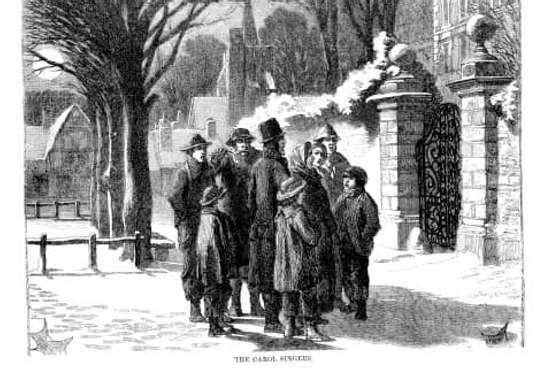
"God rest ye merry, Gentlemen"
God rest ye merry, gentlemen
Let nothing you dismay
Remember Christ our Savior
Was born on Christmas Day
— "God Rest Ye Merry, Gentlemen"
The first line of this very old (15th century, by some estimates) song has a number of elements that typically throw listeners for a loop; in addition to the ambiguity of the verb rest, there's the swapping out of "you" for the ecclesiastical pronoun "ye" in some versions, as well as inconsistency with regard to where the comma is placed.
Because some texts place the comma before "merry," some readers or listeners interpret the adjective as modifying "gentlemen," leaving rest as a transitive verb with you as its object (for a phrasing similar to "God rest your soul" or "God bless you"). But "god rest you merry" was, at the time the text was written, an established expression of good wishes in its own right:
AUDREY. Do, good William.
WILLIAM. God rest you merry, sir.
— William Shakespeare, As You Like It
With that interpretation, "gentlemen" becomes an instance of direct address: "be well and happy, Gentlemen."

"Good tidings we bring"
Good tidings we bring to you and your kin
We wish you a merry Christmas and a happy new year
— "We Wish You a Merry Christmas"
Tidings appears in a number of Christmas carols; in addition to "We Wish You a Merry Christmas," we also find it in "God Rest Ye Merry, Gentlemen," which speaks of "tidings of comfort and joy."
Tiding is defined as a piece of news, and is often found in the plural, modified by good or glad. Although there is nothing specific in the meaning or origin of tiding that pertains to Christmas (it derives via Middle English from Old English and relates to betide, meaning "to happen especially by fate"), we most often see the word in contexts pertaining to the Christmas season.
The word's Christmas pedigree precedes its use in song however; it occurs in Luke 2:10 of the King James Bible (in a line made popular to many generations of children by Linus Van Pelt), when the angel delivers the news of the arrival of the Savior: "Fear not: for behold, I bring you good tidings of great joy, which shall be to all people."

"In sin and error pining"
Long lay the world in sin and error pining,
Till He appear'd and the soul felt its worth.
— "O Holy Night"
The words to "O Holy Night" were taken from a translation of a French poem, "Minuit, chrétiens" ("Midnight, Christians") written by Placide Cappeau in the 19th century. It was set to music by Adolphe Adam with the words to the English version composed by John Sullivan Dwight, a Unitarian minister.
Pine is a verb with two meanings in the dictionary: "to lose vigor, health, or flesh (as through grief) : languish" and "to yearn for something unattainable." Some listeners might understandably extract from this lyric the wishful meaning of the latter sense, but the line more likely alludes to a world languishing in sin before the appearance of Christ. Cappeau's original line speaks of the Savior appearing "Pour effacer la tache originelle / Et de Son Père arrêter le courroux" ("to erase original sin / and put an end to his father's wrath").

"And then we got upsot"
The horse was lean and lank
Misfortune seemed his lot
He got into a drifted bank
And then we got upsot
— "Jingle Bells"
"Jingle Bells" is one of the most popular holiday tunes, written in 1850 by James Lord Pierpont, the uncle of financier J. P. Morgan. It has a long tradition as a staple of schoolchildren, who are often taught nothing beyond the innocuous first verse.
The lesser-sung later verses are ripe with unusually dark narrative, including the sleigh becoming overturned and the narrator's wistful advice, voiced in the imperative, to "go it while you're young."
Upsot is a rare dialectical past participial form of upset that was probably chosen for its rhyme with "lot." Despite its use in "Jingle Bells," upsot is entered in very few dictionaries. When it is encountered in literature, it is usually as part of character speech:
I put up with him till harvest was in, and then one day my patience give out. He upsot a churnful of cream in the back yard--and was just as cool as a cowcumber over it--laughed and said it was good for the land. I told him I wasn't in the habit of fertilizing my back yard with cream. But that's the men for you.
— Lucy Maud Montgomery, "Aunt Philippa and the Men," 1915

"Round yon virgin"
Silent night, holy night
All is calm, all is bright
Round yon virgin Mother and Child
Holy infant so tender and mild
— "Silent Night"
Some listeners trip up over "round" in "Silent Night," misinterpreting it as the start of a new sentence (which might be thought of as an imperative verb, perhaps, as in "round up"). But round is simply a truncated spelling of the preposition around. (Sometimes you see it spelled in lyrics with the initial apostrophe.) Yon is an adjective meaning "yonder," or "over there in the distance."
The word's function as a preposition gives context to the line that comes before: all is bright over there, around the virgin Mother and Child.

"Troll the ancient yuletide carol"
Troll the ancient Yuletide carol
Fa la la la la, la la la la
— "Deck the Halls"
Troll might make us think of internet commenters today, but the verb featured in "Deck the Halls" has nothing to do with harassers, or with creatures living underneath bridges, for that matter. The dictionary defines it as "to sing the parts of (something, such as a round or catch) in succession," or more broadly, "to sing loudly" or "to celebrate in song."
To troll something was to cause it to move round and round, as a child might do to a hoop in olden times. The idea of singing in rounds followed before the verb broadened in sense to mean "to sing."

"And to you your wassail too"
Love and joy come to you, And to you your wassail too
And God bless you and send you a Happy New Year
— "Here We Come A-Wassailing"
Wassail started off as a salutation, derived from the Old Norse toast vas heill ("be well"). "Here We Come A-Wassailing" celebrates the tradition of going wassailing, in which carolers would travel at night and sing at homes and be rewarded with a warm beverage by the people they visited. The lyrics include an assurance that the singers are not strangers ("We are not daily beggars / That beg from door to door / But we are neighbors' children / Whom you have seen before"), which might not have been obvious in the darkness.
Wassail soon came to refer to the beverage itself, which invites a dual interpretation in the chorus: in "to you your wassail too" one envisions the singers holding their cups aloft, offering not a literal drink but a wish for good health for the generous homeowner.





